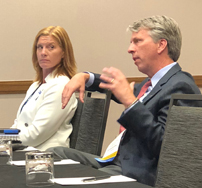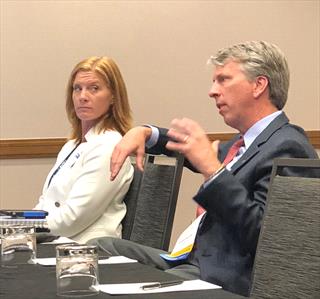
news

VIN News Service photo
Officials in the AVMA are considering dedicating more resources to international activities. During a House of Delegates meeting this month, Dr. Frederick Baum, a delegate for Vermont, said he supports the initiative but called it "enormously complex." Looking on is Dr. Jodie Pettit, alternate delegate for Iowa, who was part of a breakout discussion on the topic.
Members of the American Veterinary Medical Association soon will be asked whether the national organization should expand its outreach internationally.
Details of how and when AVMA members will be consulted are in development.
The topic of international outreach arose during a meeting of the AVMA House of Delegates this month in Denver. As the organization's primary policymakers, delegates took inventory of the AVMA's current international work and discussed whether more of the group's $37 million budget should be devoted to international outreach and elevating veterinary education in developing countries.
Floating around were estimates that the AVMA spends $500,000 annually on projects outside of the United States, but no one could provide an exact figure. Given that 56 percent of the AVMA's annual revenue — $44.5 million in 2017 — comes from dues, delegates asserted that AVMA members should be consulted before the group spends more on international activities.
Those in favor of increasing the AVMA's global outreach say it can elevate veterinary medicine in "underdeveloped" countries. What's more, the group has no leadership role in the World Organisation for Animal Health, World Health Organization or World Trade Organization. "AVMA is starting to recognize the size and complexity of the pool they are just beginning to dip a toe into," AVMA President Dr. John de Jong said.
Decisions by world groups can impact the U.S. veterinary profession, he said. As an example, de Jong pointed to the WHO, which recently considered banning ketamine — a drug veterinarians use as an anesthetic and adjunct to pain control, as well as an equine tranquilizer, but is recreationally abused. The move ultimately was rejected in response to heavy lobbying by AVMA and other organizations.
Dr. Gregory Daniel, a delegate representing the American Association of Veterinary Clinicians, questioned whether many AVMA members "understand the importance" of becoming more active internationally. To make spending beyond U.S. borders more palatable to the AVMA's general membership, delegates discussed replacing the term "global" with "international."
Dr. Matthew Boyle, associate delegate for Minnesota, said veterinarians in his state wonder why the AVMA is looking to take on greater international responsibilities. "Just saying 'We want globalization' is a nebulous statement. …It's very vague," he said. "I have a hard time clearly articulating how this translates to member value. If we're going to do something significantly toward globalization, there would need to be some sort of information campaign to say how what we're doing benefits members."
AVMA members will question whether the group is spending its money wisely, predicted Dr. Jim Brett, delegate for Mississippi. " 'A' stands for American," he said. "We do have members who have that view. If we're going to sell this, we need to do a better job of getting this information out to the grassroots."
To that end, the House advised the AVMA Board of Directors to:
- Create a communication plan to educate members about AVMA's current international activities, and gauge whether members support them.
- Determine the opinion of members on increasing the AVMA's global outreach.
- Develop tools to assess member interest in getting involved personally with international initiatives and volunteer opportunities.
- Explore new international AVMA membership category models.
A majority of delegates spoke in support of spending more AVMA funds internationally — opinions very different from those voiced several years ago, when delegates openly questioned why the Council on Education was extending its brand of accreditation to overseas programs.
The COE, an organization of the AVMA, is the nation's sole programmatic accreditor of U.S. veterinary education. Texas delegate Dr. Wally Kraft said spreading AVMA resources overseas has been a controversial topic since 1998, when the COE accredited the University of London Royal Veterinary College. During the next two decades, the COE accredited a dozen other foreign programs. All the while, some AVMA members have questioned why the COE devotes energies to programs beyond U.S. borders, even when other accrediting bodies exist on those countries.
The upshot to foreign accreditation, Kraft said, is that many programs improve due to their interactions with the COE. "The schools in Ireland and Switzerland had some problems … (but) within a year, they were ready to roll," he noted as an example.
"It would behoove us to help South American countries. They need us," Kraft added.
Georgia delegate Dr. Seyedmehdi Mobini echoed the need for education resources in underdeveloped countries, even if accreditation isn't on the table. Reflecting on time he spent volunteering in Afghanistan, he said, "They had access to a lot of knowledge, but they didn't know how to apply it."
Dr. Katherine Waters, alternate delegate for the American Association of Food Safety and Public Health Veterinarians, said she recently spent two weeks working in Thailand, where she "met a number of bright and dedicated public health students and veterinarians who understand the need for collaboration worldwide for public health and food safety."
Others posited that if the AVMA doesn't cement its position as the world leader, another organization might. "Our relevance hinges on this," said Dr. Cathy Lund, a delegate representing Rhode Island. "If we don't step up on the leadership side of this issue, we're not going to be looked like as having any say. …We're the largest (veterinary) organization in the world."
As of Dec. 31, 2017, 942 of the AVMA's 91,000-plus members lived outside of the United States. Of those, 352 were in Canada. Not much is known about the rest. "We don't ask citizenship," said Dr. Beth Sabin, AVMA associate director for International and Diversity Initiatives.
To draw more international veterinarians to the AVMA, delegates proposed discounting the standard $330 annual dues for practitioners in "disadvantaged" countries; they did not specify how to identify such countries. Delegates said that by joining, foreign veterinarians would get access to AVMA journals and educational opportunities.
Dr. Robert Groskin, alternate delegate with the Association of Avian Veterinarians, pointed out that his association has done just that. "We lowered our membership fee to $10 a year for veterinarians living and working in these nations," he said. Groskin did not identify the countries from where veterinarians could apply for the discount or how many took advantage of it.
Others suggested adding to AVMA renewal forms an option for members to give separately to international activities.
Dr. Ronald Gill, an AVMA board member, pointed out that "there's only so much of the pie that can be cut up, as far as spending goes. Say we're spending 1.5 to 2 percent [of the AVMA budget] globally now … and we want to go up to 3 percent, where do we take that 1 percent away from in the budget in order to spend more globally?"
Budgets aside, Dr. Neil Moss suggested that the AVMA focus on encouraging its members to engage globally rather than imposing its brand of veterinary medicine on foreign countries. He warned that the AVMA's good intentions might be perceived as hubris.
"The AVMA is not the World Veterinary Association or the World Small Animal Veterinary Association. I don't think the AVMA wants to become the world leader," said Moss, the delegate representing Utah. "It's very nice to be held up as the gold standard and we appreciate that in North America. We have developed a level of professional, industry and research that's perhaps one of the best in the world.
"But we need to be really careful to make sure that we are teachable, and we don't come across as, 'the best.' After a while, it will start to irritate and rub the wrong way," he said.